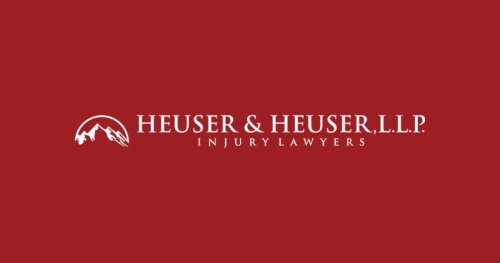Best Car Accident Lawyers in Pueblo
Share your needs with us, get contacted by law firms.
Free. Takes 2 min.
List of the best lawyers in Pueblo, United States
1. About Car Accident Law in Pueblo, United States
Pueblo, Colorado follows a fault-based system for car accident claims. This means the at-fault driver is typically responsible for resulting damages, including medical bills and property damage. You may pursue compensation through the other driver’s insurance or by filing a personal injury lawsuit if settlement attempts fail.
In Pueblo, residents often interact with local police departments, county courts, and state agencies during and after a crash. The process involves police reports, medical documentation, and communications with insurance adjusters. Understanding the basics helps you protect your rights and avoid costly mistakes.
Key concepts you should know include how liability is assigned, how damages are calculated, and how Colorado laws govern when you can file a claim. These elements affect everyone from everyday drivers to delivery teams and local business owners who rely on vehicles for work in Pueblo.
To stay informed, you can consult state and local resources that explain liability rules, injury claims, and time limits for filing. This guide uses Pueblo-specific context while reflecting Colorado law and common practices in car accident cases.
2. Why You May Need a Lawyer
Lawyers help when insurance disputes or liability questions arise after a Pueblo crash. Below are concrete, real-world scenarios where legal counsel is typically important.
- A multi-vehicle crash on I-25 near Pueblo where fault is shared among several drivers and the insurer disputes who was primarily liable.
- A collision causing serious injuries that require long-term treatment and complicate medical bills, lost wages, and future care costs.
- The at-fault driver lacks sufficient insurance or is uninsured, making it difficult to recover full damages through their policy alone.
- You suspect you are partially at fault, and the other party blames you entirely, risking a reduced recovery under Colorado comparative negligence rules.
- The crash involved a commercial vehicle or municipal vehicle, raising questions about coverage, responsibility, and possible governmental liability.
- Your medical treatment includes liens from providers or a medical facility that requires careful settlement negotiations to avoid offsetting discounts or improper billing.
In any of these situations, a Pueblo car accident attorney can help gather evidence, assess fault, negotiate with insurers, and, if necessary, file and prosecute a claim in court. An attorney can also explain how Colorado's rules of negligence and damages apply to your facts as they evolve.
3. Local Laws Overview
Comparative Negligence under Colorado law
Colorado uses a modified comparative negligence framework. Your recovery may be reduced by your percentage of fault, but you can still recover if your share of fault is below a certain threshold. This affects how settlements are approached and how damages are allocated among parties.
Practical impact in Pueblo: if you are 20 percent at fault for a crash, your potential award may be reduced by 20 percent. This principle guides how insurers evaluate settlement offers and how lawyers frame liability.
Colorado follows a modified comparative negligence standard for personal injury claims.
Source: Colorado General Assembly and state defense and civil procedure resources provide the framework for comparative negligence. See official statutes and explanations for details.
Statute of Limitations for Personal Injury and Property Damage
In Colorado, you generally have two years to file a personal injury lawsuit after a car crash. Property damage claims typically have a separate timeline, often three years. If you miss these deadlines, a court may bar your claim.
Practical takeaway for Pueblo residents: act promptly after a crash, especially if you expect to pursue compensation beyond insurance settlements. Timely action helps preserve evidence and strengthens your position.
Colorado generally imposes a two-year limit on personal injury actions from the date of injury.
Source: Colorado General Assembly and Colorado Judicial resources outline the statute of limitations for personal injury and related claims. Architectural references include the two-year rule for injuries.
Financial Responsibility and Insurance Minimums
Colorado requires drivers to carry financial responsibility for auto accidents, including minimum liability coverage. The current minimums are commonly cited as 25/50/15: $25,000 per person for bodily injury, $50,000 per incident, and $15,000 for property damage.
These rules influence what you can claim and how settlements may be structured. In Pueblo, if you lack adequate coverage, you may need to look at your own UM/UIM coverage or other remedies to recover costs.
Practical note: verify your own policy limits and understand the uninsured/underinsured motorist options before negotiating with insurers.
Source: Colorado Department of Motor Vehicles and state insurance resources describe minimum coverage requirements and related protections.
4. Frequently Asked Questions
What documents should I gather after a Pueblo car crash?
Collect the police report, photos of the scene, and contact information for all parties and witnesses. Also gather medical records, bills, employment records, and insurance details.
How do I start a car accident claim in Colorado?
Notify your insurer, seek medical care, and document all damages. If settlement fails, consider consulting a Pueblo attorney to evaluate a potential lawsuit.
What is the statute of limitations for personal injury in Colorado?
Usually two years from the date of the accident. Cases filed after that period may be barred by the court.
Do I need a lawyer if the other driver is insured and at fault?
A lawyer can still help maximize your recovery, evaluate fault, and handle complex negotiations or medical liens that insurers may impose.
How much money can I recover for medical bills and wages?
Damages include medical expenses, lost wages, and reasonably anticipated future costs. A lawyer can quantify damages and project future treatment needs.
Can I sue for pain and suffering in Colorado?
Yes, if fault is established and the injuries meet the case requirements. A lawyer helps assess non-economic damages and their value.
What is the difference between a settlement and a trial?
A settlement resolves the dispute out of court with an agreement. A trial resolves the dispute by a judge or jury verdict after presentation of evidence.
Do I need to file a report with local Pueblo authorities?
Yes, if there are injuries or significant property damage. Police reports create an official record that supports your claim.
Is my claim affected by comparative negligence if I was partly at fault?
Yes, your recoveries may be reduced by your share of fault. The extent of fault determines the final compensation.
How long does it typically take to resolve a Pueblo car accident case?
Some cases settle in weeks, others take months to years depending on medical complexity and insurer negotiations. A lawyer can estimate a timeline.
Should I talk to the at-fault driver’s insurer without a lawyer?
Be cautious. Insurance adjusters may ask for statements that could harm your claim. Consult an attorney before providing details.
Can I use medical liens to cover treatment while my case is ongoing?
Medical liens can complicate settlements. A lawyer can negotiate and coordinate lien resolution with providers.
5. Additional Resources
- Colorado Department of Motor Vehicles - explains auto insurance requirements and financial responsibility for Colorado drivers.
- Colorado Department of Transportation - provides safety resources, crash data, and traffic safety information relevant to Pueblo and statewide trends.
- Colorado General Assembly - official statutes and legislative summaries including comparative negligence and limitations on actions.
- National Highway Traffic Safety Administration - federal guidance on crash prevention and safety data applicable to Colorado residents.
6. Next Steps for Finding and Hiring a Car Accident Lawyer in Pueblo
- Identify your goals and gather all crash documentation within 24-72 hours of the incident, including police reports and medical records.
- Research Pueblo lawyers who focus on car accidents and have experience with Colorado comparative negligence cases.
- Request initial consultations and prepare a short list of questions about fees, case strategy, and timelines.
- Ask about contingency fee arrangements and any upfront costs or medical lien handling practices.
- Bring key documents to consultations and assess each attorney's ability to explain complex issues in plain language.
- Choose a lawyer who explains damages, liability, and settlement options clearly and respects your medical needs.
- Retain counsel and establish a communication plan with milestones for settlements, medical updates, and potential filings.
Notes and sources: Colorado comparative negligence, two-year personal injury statute of limitations, and minimum insurance requirements are described in official state resources. See Colorado General Assembly for statutes and Colorado DMV for coverage details. Colorado Department of Transportation provides crash data and safety resources. National and state-level safety guidance is available from NHTSA for broader context.
Lawzana helps you find the best lawyers and law firms in Pueblo through a curated and pre-screened list of qualified legal professionals. Our platform offers rankings and detailed profiles of attorneys and law firms, allowing you to compare based on practice areas, including Car Accident, experience, and client feedback.
Each profile includes a description of the firm's areas of practice, client reviews, team members and partners, year of establishment, spoken languages, office locations, contact information, social media presence, and any published articles or resources. Most firms on our platform speak English and are experienced in both local and international legal matters.
Get a quote from top-rated law firms in Pueblo, United States — quickly, securely, and without unnecessary hassle.
Disclaimer:
The information provided on this page is for general informational purposes only and does not constitute legal advice. While we strive to ensure the accuracy and relevance of the content, legal information may change over time, and interpretations of the law can vary. You should always consult with a qualified legal professional for advice specific to your situation.
We disclaim all liability for actions taken or not taken based on the content of this page. If you believe any information is incorrect or outdated, please contact us, and we will review and update it where appropriate.









